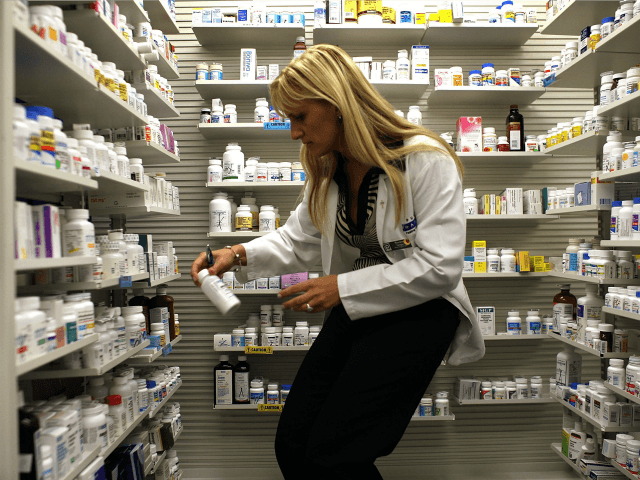President Donald Trump’s campaign promises already have convinced drug companies to lower prices and increase transparency.
In January, Trump put the pharmaceutical industry on notice that drug prices were too high. President Trump explained that drug companies were “getting away with murder.” Trump added, “PhRMA has a lot of lobbies, a lot of lobbyists, a lot of power. And there’s very little bidding on drugs. We’re the largest buyer of drugs in the world, and yet we don’t bid properly. We’re going to start bidding. We’re going to save billions of dollars over a period of time.”
Later that month, the president argued that the federal government could save $300 billion if it could negotiate drug prices.
President Trump explained in an interview with Time magazine, which named him “Person of the Year,” that he intended to lower drug prices. Trump said, “Well actually the drug companies haven’t done well. I saw the other day the drug companies have not gone up very much. Because I’m going to bring down drug prices. I don’t like what’s happened with drug prices.”
Trump lamented that the pharmaceutical lobby impeded the ability for the government to negotiate drug prices. “We don’t do it,” he said. “Why? Because of the drug companies.”
In the past, Congress has failed to enact sufficient reforms to lower drug prices. When Congress was drafting the Medicare Part D prescription-drug benefit, big pharma added a provision which banned the Centers for Medicare and Medicaid Services from negotiating with drug companies to set prices.
Last December, the Senate blocked a measure from Senator Bernie Sanders to amend the 21st Century Cures Act, allowing the importation of prescription drugs from other countries and for Medicare to negotiate drug prices. Sanders said on the Senate floor, “I am quite confident that all of my Republican colleagues will support an amendment in my hands that will do exactly what Trump said he would accomplish as president.”
Now, pharmaceuticals cost America over $350 billion a year, which is roughly two percent of gross domestic product. Ravo Mehrotra, of MTS Health Partners, estimated that the government could save $16 billion if the government negotiated drug prices.
In March, President Trump tweeted that he is working on a new system to bring down drug prices.
I am working on a new system where there will be competition in the Drug Industry. Pricing for the American people will come way down!
— Donald J. Trump (@realDonaldTrump) March 7, 2017
Later that month, two of the biggest pharmaceutical firms announced that they will lower the cost of their pharmaceuticals.
Sanofi and Regneron Pharmaceuticals Inc. said that its new treatment for atopic dermatitis, a painful skin condition, will cost $37,000. This is a substantial decrease from the $50,000 price tag for similar treatments.
Roche Holdings AG, lowered its price for a multiple sclerosis drug to $65,000, 25 percent cheaper compared to a 15 year-old competitor, Rebif.
Regeneron CEO Leonard Schleifer told investors, “We believe that Sanofi and Regeneron and the payers are heading perhaps towards setting a new paradigm.” Schleifer added, “But it ain’t over yet.”
Roger Longman, CEO of data analytics company Real Endpoints, said that pharma companies will have to lower drug prices under President Trump. Longman said, “In the old days, if you could convince the physician that one drug was slightly better than another, then he or she would prescribe it, it didn’t matter what the cost was.” Longman added, “Now, the decision makers are the payers: the insurance companies, the employers.”
Marathon Pharmaceuticals paused the launch of its new drug, Emflaza, facing intense public scrutiny regarding the drug’s astronomical $89,000 price tag. Martin Shkreli, famous for raising the price of the drug Daraprim, said that, “These guys invented price increases. I literally learned it from them.”
Since the election of Donald Trump, several large drug companies offered to lower the annual increase of drug prices. Novo Nordisk President Jakob Riis promised to limit the annual increase in drug prices. Riis explained, “We hear from more and more people living with diabetes about the challenges they face affording healthcare, including the medicines we make. We take this issue seriously and have been thinking about what we can do to better support patients,” Riis said. “This has become a responsibility that needs to be shared among all those involved in healthcare and we’re going to do our part.”
Novo Nordisk followed the leadership of Brent Saunders, chief executive of Allergan, who issued a “social contract,” promising to limit the annual increase of the price of pharmaceuticals.
Merck, Johnson & Johnson, and Lilly unveiled plans to increase their transparency regarding their drug pricing.
President Trump pledged to lower the price of drugs by easing regulations from the Food and Drug Administration, which would make it easier to get drugs approved. Trump stated, “We’re also going to be streamlining the process, so that, from your standpoint, when you have a drug, you can actually get it approved if it works, instead of waiting for many, many years.”
Robert Hugin of Celgene argued that the changes encouraged by President Trump stand to benefit every American. Hugin said, “The changes he is proposing are ones that I think are going to be great for the country and consumers.”

COMMENTS
Please let us know if you're having issues with commenting.